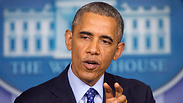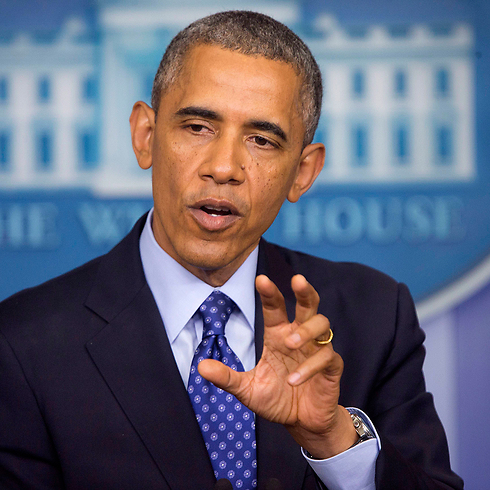
Obama: Iran could play constructive role in Iraq
Amid growing Israel concerns that US cooperation with Iran could harm the pending nuclear deal with the Islamic republic, Obama urges Iran to play constructive role, announces US to send 'military advisors' to failing state.
President Barack Obama said Thursday Iran can play a constructive role in Iraq and said the US was dispatching up to 300 military advisers to Iraq to help quell the rising insurgency in the crumbling state.
The comments came amid growing Israeli fears that the jihadist offensive in Iraq may prompt concessions to arch-foe Iran from its longtime ally the United States.
Addressing the ISIS offences in Iraq, Obama said that if Iran comes into the conflict solely as an armed force backing the Shiite-led government, its involvement would probably worsen the situation.
He further said Iran's leaders have a decision to make about what role to play in Iraq and said Tehran should consider whether its view of the region is solely through sectarian frames, in which case, Iran could find itself fighting in lots of places in the world.
Obama called on Iran to demand Iraqi leaders govern with a more "inclusive agenda" to ensure the country does not descend into civil war.
Though not specifically mentioning airstrikes, an option the US has been considering, Obama said he was leaving open the possibility of "targeted" military action in the future. He said that in addition to the military advisors the US also would increase its intelligence efforts in Iraq and was creating joint operations centers with Iraqis.
When coupled with previously announced steps, Obama's actions could put about 600 additional US troops back on the ground in Iraq. The 300 military advisers he announced Thursday would join up to 275 being positioned in and around Iraq to provide security and support for the US Embassy in Baghdad and other American interests.
But he was adamant that US troops would not be returning to combat.
"We do not have the ability to simply solve this problem by sending in tens of thousands of troops and committing the kinds of blood and treasure that has already been expended in Iraq," Obama told reporters in the White House briefing room. "Ultimately, this is something that is going to have to be solved by Iraqis."
Sketching a dire situation, Obama called this a moment when "the state of Iraq hangs in the balance" and cautioned that "there's not going to be a simple military solution."
"Let's not plunge this back into the abyss," he said.
The US withdrew the last American troops from Iraq in late 2011 after more than eight years of war. The withdrawal came after Washington and Baghdad were unable to reach an agreement to extend the US troop presence.
Nukes or Iraq?
"If Washington needs Tehran's help to solve the Iraq crisis, the United States will need to be more flexible in negotiations on Iran's nuclear program," public radio cited a senior official as saying.
Israel Tourism Minister Uzi Landau warned Wednesday: "We're in a situation where, to confront the threat from the global jihad, we rely on Iran and its allies."
The rise of the jihadist Islamic State in Iraq and the Levant (or ISIS), which has seized Iraq's second city Mosul and a swathe of its north and centre over the past 10 days, has prompted talk of possible cooperation between Washington and Tehran to help stop the insurgency.
A top Iranian official said on Wednesday that Tehran could consider working with the United States over the crisis in Iraq if talks on its nuclear program are successful.
The Iranian official's comments came after US Secretary of State John Kerry said Monday he would be open to cooperating with Iran on Iraq.
"I wouldn’t rule out anything that would be constructive," Kerry told Yahoo News when asked if the United States would cooperate militarily with Iran, one of Iraqi Prime Minister Nuri al-Maliki's key allies.
US Deputy Secretary of State William Burns held a brief meeting with Iranian officials in Vienna on Monday on the sidelines of talks between Tehran and the major powers over its controversial nuclear program.
Israel - which has the Middle East's sole if undeclared nuclear arsenal - is deeply opposed to the talks, which also involve its US ally and aim for a long-term deal to set out clear limits to Iran's nuclear ambitions.
The Associated Press and AFP contributed to this report












